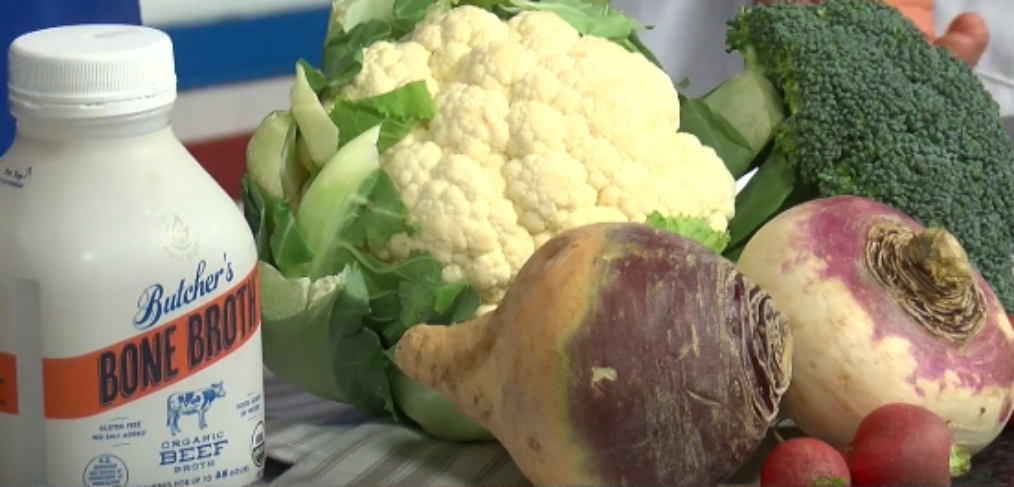
Eating for Immunity
Eating to boost your immunity may be a powerful weapon in these times of uncertainty. While scientists debate which approaches are working in the battle against pandemic viral disease, we can rest assured that nutrient-dense whole foods are never contraindicated! Further, we can start by nourishing ourselves with the primary foods of love, gratitude, laughter and faith.
Eat Cysteine for Strong Immunity
Your body makes its own master antioxidant, called glutathione. Especially in diseases that attack the lungs, you use a lot of this antioxidant to fight inflammation & congestion. However, in order to keep up with the production demand, you have to have a good supply of the amino acids glycine and cysteine. You can augment your stores with the following:
- a good quality source of whey
- pastured poultry
- spinach
- low-toxicity seafood
- legumes
- bone broth
In addition, eating cruciferous vegetables can support immunity. Plant compounds in this family increase glutathione formation. So, load up on kale, cabbage, cauliflower, broccoli, Brussels sprouts, arugula, radishes, rutabaga, turnips, parsnips, watercress, and horseradish!
Eating Hygiene Impacts Immunity
Your body has a mechanism to kill germs that enter through the mouth. It’s called stomach acid. But stress curtails stomach acid production. So, when you sit down to a meal, breathe deeply, express gratitude, eat slowly & chew thoroughly. It may also help your stomach pH to sip 1 tablespoon of apple cider vinegar in a glass of water.
Furthermore, you can support healthy digestion and better immunity by feeding your gut microbiota. Did you know that 80% of your immune system is in your gut. Supporting the right kind of microbes goes a long to toward fending off the enemy. The probiotics that live in your GI tract love fiber! In particular, they feast on garlic, onions, oats, Jerusalem artichokes, and asparagus. Eating probiotic foods, such as kimchi, kefir, and kombucha supports healthy immunity.
Boost Immunity with Vitamins and Minerals
Vitamin C and zinc are immunity all-stars. Vitamins A & D are vital, too. But at this point, you are advised to keep your immune system strong by eating nutrient-dense foods, rather than taking high doses of supplements. Maximum doses of Vitamin A and D supplements appear to enhance the receptors through which the corona virus is entering the body.
Top foods for vitamin C include papaya, kiwi, acerola cherries, red bell peppers, and amalaki berries. Oysters are an incredible source of zinc. Other shellfish, grass-fed beef, lentils and almonds contain fairly high levels of zinc, too. You can’t beat liver and egg yolks for their Vitamins A & D content! Sunlight, and yellow-orange-red vegetables are also important.
You might like Immunity Soup, which has a nutrient-rich profile of vitamins and minerals.
Eat Anti-Viral Foods
Not all viruses respond the same way, but a study of a virus related to the current SARS-COV-2, showed that tannic acid exhibited inhibitory activity. This acid is responsible for giving many foods a bitter or astringent taste. Black and puer teas (both caffeinated & decaffeinated) are the highest sources of tannic acid, but you will also find it in red raspberry leaf tea, pomegranates, and cranberries.
Another study found polyphenols to have anti-viral activity against the corona family of viruses. Polyphenols occur in deeply-colored produce such as berries and leafy greens. Along with their anti-microbial benefit, polyphenols serve as fodder for your gut microbes.
Besides tannic acid and polyphenols, selenium may be helpful. Eat selenium-rich foods for immunity rather than taking a supplement. It appears that supplements may enhance receptors in the body that the virus can enter through. Brazil nuts are the most common food source of selenium. Two or three nuts a day is sufficient.
Finally, raw garlic seems to be a good anti-viral food in general. However, at this point, we don’t know if it attacks SARS-COV-2. If you’re turned off at the idea of chomping on a fresh bulb of garlic (I am!), raw garlic is great in salsas, salad dressings, guacamole, mashed potatoes, and hot sauces.
Avoid Inflammatory Foods
One of the reasons people die with pandemic viruses such as the coronavirus is that the disease process sets off a “cytokine storm.” Cytokines are inflammatory messengers your body produces. Already having inflammation in your body puts you at greater risk for this kind of inflammatory storm. Curtail your use of sweeteners, refined carbohydrates, vegetable oils and processed meats. Whatever foods bolster your defenses, I’m sure of this: You won’t fight COV-19 eating Twinkies!

One comment